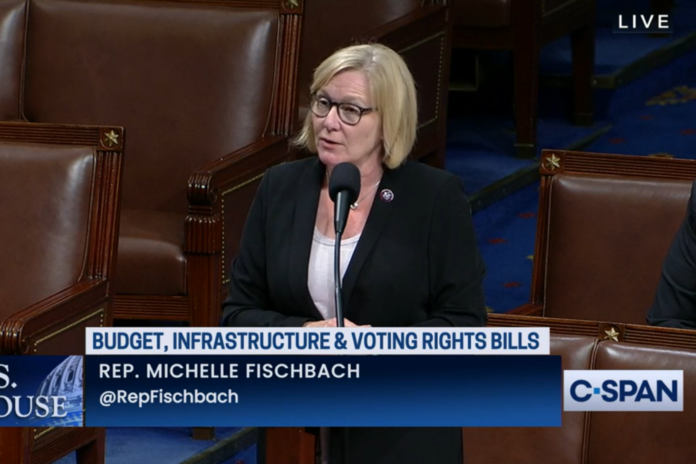Rep. Michelle Fischbach of Minnesota slammed various spending and voting bills pushed by Democratic lawmakers Tuesday.
During a session of the U.S. House of Representatives, Fischbach spoke out against the coupling of a $1.2 trillion bipartisan infrastructure bill with a $3.5 trillion reconciliation bill that has been met with staunch Republican opposition.
“Our country’s infrastructure should not be tied to the Democrats’ partisan spending spree, especially during a pandemic,” she said.
“But here we are. Until Democrats stop playing games and work with their colleagues on a truly bipartisan compromise, I urge my colleagues to oppose this rule and the underlying bills.”
Fischbach argued that rising inflation and President Joe Biden’s signing of a $1.9 trillion COVID bill — the latter of which she characterized as “paying people not to work” — make it particularly unwise to spend federal money at the “highest sustained level” in American history.
Paleoconservative commentator and author Pat Buchanan has previously blasted the $3.5 trillion reconciliation bill as a “Great Leap Forward into socialism,” saying it will fund universal pre-K, two years of free community college, and amnesty for illegal immigrants.
“Democrats know their proposals are unpopular,” Fischbach said. “They can’t even get their own conference to agree. Instead, they’re resorting to smoke and mirrors to push it through and hoping the American people aren’t paying attention.”
The House ultimately voted in favor of a rule that both advanced the budget resolution and set a Sept. 27 date for voting on the infrastructure package, according to C-SPAN.
Rep. Marjorie Taylor Greene of Georgia told Steve Bannon on “War Room: Pandemic” last week that she would “personally spend money against” any Republican House member who voted for either the infrastructure bill or the $3.5 trillion reconciliation bill.
In addition to criticizing the Democratic spending bills, Fischbach also spoke out against their “John Lewis Voting Rights Advancement Act,” also known as H.R. 4.
“The Constitution places the responsibility for elections at the state level, and we have a long history of letting each state run their own elections,” she said.
“But H.R. 4 grants the federal government unprecedented control over state and local elections. It empowers the attorney general to bully states and force those states to seek federal approval before making changes to their own voting laws.”











